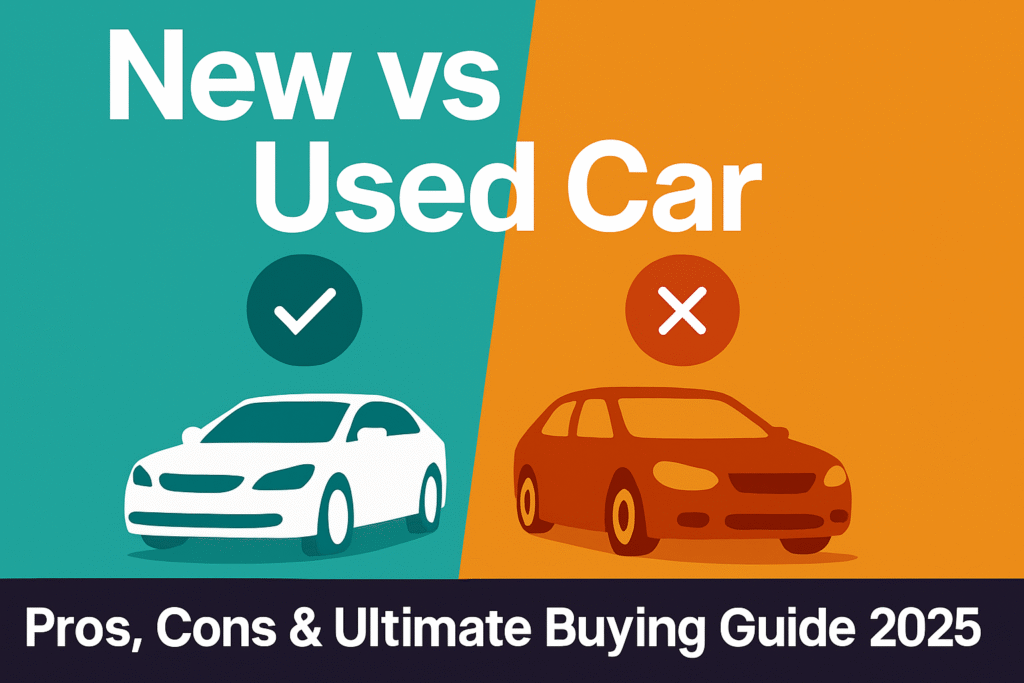Choosing between a new vs used car is one of the most significant automotive decisions a buyer can face. Whether it’s a quest for the latest features, budget restrictions, or the hunt for the best value, the right choice can shape both your daily life and your long-term finances. This extensive guide explores the pros and cons of both options, helping buyers make a well-informed decision.
Why the New vs Used Car Debate Matters
The automotive market in 2025 has evolved rapidly, with both new and pre-owned segments seeing innovation and demand. While new cars attract buyers with modern design, technology, and complete warranty coverage, used cars offer compelling benefits for those seeking value, lower costs, and slower depreciation. Each route has its unique appeal, risks, and rewards.
Also Read: 2025 BMW 2 Series Gran Coupe Launched at ₹46.90 Lakh
Pros and Cons of Buying a New Car
Pros
- Latest Features and Technology: New cars come with the most advanced safety systems, infotainment, and connectivity options.
- Full Manufacturer Warranty: Most new cars include warranties covering major repairs for at least 2–5 years, providing peace of mind.
- Customization Options: Buyers can choose colors, trims, and features according to their exact requirements.
- Better Reliability: A brand-new car is free from prior wear and tear or hidden issues, ensuring consistent performance.
- Lower Early Maintenance Costs: With everything fresh from the factory, repairs and service costs are generally minimal for several years.
- Superior Fuel Efficiency and Emission Standards: Compliance with the latest emission norms and better mileage is standard.
- Lower Loan Interest Rates: Manufacturers and banks often offer attractive finance rates for new vehicles.
- Higher Early Resale Value: Well-maintained new cars can command better values during the initial few years.
Cons
- Higher Purchase Price: New cars demand a big initial investment, making ownership more expensive.
- Rapid Depreciation: Expect a drop in value of 20–30% in the first year alone, which can significantly impact eventual resale value.
- Greater Insurance Premiums: Higher value means insurance companies charge higher premiums on new vehicles.
- Additional Fees: Registration, road tax, and other regulatory fees are higher for new purchases.
- Hidden Costs for Customization: Factory extras and premium trims can add substantially to the sticker price.
- Limited Immediate Inventory: Instant delivery isn’t always guaranteed if the desired configuration isn’t in stock.

Pros and Cons of Buying a Used Car
Pros
- Lower Purchase Price: Used cars are often available at a fraction of their original cost, offering buyers higher-end models within budget.
- Slower Depreciation: The majority of depreciation occurs within a car’s first years. Used vehicles depreciate less rapidly, preserving their value better for your tenure.
- Reduced Insurance Costs: Lower car value generally translates into lower insurance premiums.
- Affordable Financing: Lower loan amounts mean smaller EMIs, and many financial institutions now offer competitive rates for pre-owned vehicles.
- Certified Pre-Owned Options: Many dealers offer certified used vehicles inspected and warrantied for added peace of mind.
- Lower Registration Fees: State registration charges for used vehicles are typically much lower.
- Choice Within Budget: Buyers can afford cars from higher segments or more premium brands in the used market.
- Eco-Friendly: Buying used helps reduce the overall carbon footprint by extending the lifecycle of existing vehicles.
Cons
- Potential for Hidden Issues: Some used cars might have undisclosed mechanical, accidental, or cosmetic problems, especially from private sellers.
- Limited or Expired Warranty: Not all used cars come with warranty coverage; expensive repairs can be a risk if issues arise.
- Higher Maintenance and Repair Needs: Older vehicles may demand more frequent servicing and unexpected repairs.
- Restricted Customization: The used car market offers “what you see is what you get”—changing specifications later can be costly.
- Possible Technology Gap: Used models may lack recent updates in safety, comfort, or infotainment.
- Interest Rates Can Be Higher: Depending on provider and vehicle age, used car loans sometimes come with costlier rates than those for new cars.
Also Read: Maruti Escudo: Top Reasons Why It Could Be the Best Budget SUV

Comparison Table: New Car vs Used Car
| Feature | New Car | Used Car |
|---|---|---|
| Purchase Price | High | Low |
| Depreciation | Rapid first 1-3 years | Slower after initial drop |
| Warranty | Full manufacturer warranty | Limited/None, except certified options |
| Insurance Cost | Higher premiums | Lower premiums |
| Maintenance Cost | Lower initially | Higher as car ages |
| Customization | Full flexibility | Minimal or as-is |
| Technology | Latest features | May lack recent tech |
| Environmental Impact | Higher carbon footprint (manufacture) | Lower, as lifecycle is extended |
How to Decide: New vs Used Car
The choice between new vs used cars depends on the following factors:
- Budget and Financing: If financial flexibility is a priority and you want to reduce loan burden, a used car may be smarter.
- Desired Features and Tech: Passionate about the latest technology and comfort? A new car could be more appealing.
- Ownership Intent: Short-term users might prefer a used car to avoid major depreciation loss, while long-term keepers may find a new car’s reliability and warranty advantageous.
- Maintenance Habits: If peace of mind and low early maintenance costs are key, new makes more sense. Budget-conscious or DIY-enthusiast owners might embrace a used vehicle.
Conclusion
There’s no universal answer to the new vs used car debate. Both have undeniable merits and drawbacks. Carefully consider what matters most—be it cost savings, latest innovations, or hassle-free ownership. Reviewing multiple cars, getting pre-purchase inspections for used options, and comparing total cost of ownership are crucial steps. The best decision is an informed one, tailored to your needs and financial plans.
For official automotive market statistics and industry insights, refer to the Society of Indian Automobile Manufacturers (SIAM).

